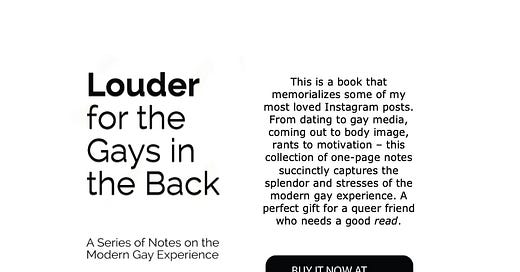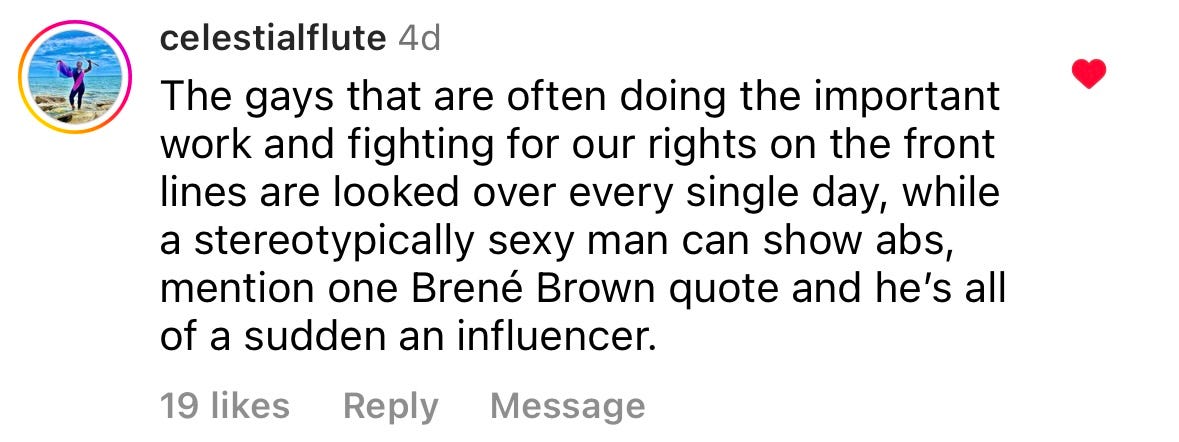Roundup #56 🥱🌈
Attention-grabbing job applications, PhD or nah, starting a business as a creative, and tips on being out in corporate America.
Welcome to The Boring Gay newsletter where I cover topics including the gay experience, career, money, and cars. In this edition, I answer career questions from my IG community.
Question 1
I submitted my application via LinkedIn/original job posting. How else can I snag their attention?
Lex: Once you’ve submitted the application the ball is really in their court. Until they do some sort of phone interview or response, you don’t have an opportunity to reply back with a thank you or to ask thoughtful questions to show your interest (which, tbh, I find a little try-hardy depending on how you do it). But this highlights how important it is to put as much effort as possible into your application when you submit it. I always recommend that people do a nice cover letter (3 paragraphs or so) that is completely tailored to the job posting. Hiring managers are savvy to your copying and pasting, so if your cover letter is just about you and not about this particular job it’s obvious you didn’t put much time into it. And why would you want to hire someone half-assing the application?
Paragraph one of the cover letter should be some basics about what you’re looking for, your experience and education, and why this job/company is in line with your career goals right now (even if it’s not - make it sound like it is). Paragraph two should discuss two or three key skills they’re looking for in their job posting and how you have experience with those in prior positions or through your education. Btw - get creative with the skills - even if you didn’t do it at another job or in school maybe you have the skills through a personal passion, etc. - people love to see you connecting what you do in real life to work. Paragraph three is sort of a free for all depending on the job, but can more specific reasons about why this company and job fits your career goals. You want to talk about how you can definitely do the job, but also how this experience will help you grow (i.e. “I have an extensive experience as a social media manager for fashion brands and your job presents a great opportunity to apply those skills and grow in a corporate setting.”)
The more clear it is to the hiring manager that you have read their entire posting and understand their company, the more likely you will get called back. You also want to thank them for their time but don’t sound desperate. I like to say something like “Thank you for your time - if you feel I would be a fit, I look forward to learning more about the position.” Like I’m that bitch, you still need to convince me that I should invest years of my life with you. This customized application approach takes more time, but I’d rather spend an hour applying to 3 jobs and get 1 call back than an hour applying to 10 jobs and hearing nothing. Hope this helps!
Question 2
How to decide between doing a PhD or settling with a Master’s and starting my career to earn money?
Lex: First of all - congratulations! You’ve already completed more education than most and if no one has told you lately I’m proud of you. This is a big decision that only you can make. But some practical tips are thinking through why you want the PhD. Will it add to your lifetime earnings? How much more can you make with a PhD than a Master’s in your field? These days, many job postings include salary ranges so it might be pretty easy to figure out. Are those additional earnings worth the time and effort to get the degree? Does a PhD add some other level of credibility to what you want to do? Will it get you more job callbacks, more seats at the table, more companies or institutions wanting to work with you, and more fallbacks if you burn out and want to make a career change in the future? Is there some personal reason you want a PhD - will you always feel incomplete if you don’t take that extra step? Is it less likely you’ll want to do it in the future?
At the same time, would skipping the PhD and getting some professional experience under your belt pay off more? Plenty of people with a basic education make it extremely far in their fields off of experience. This decision is very dependent on the field, but having job experience is often worth more than a degree in corporate settings (vs. academic or research settings). Whatever you choose, have comfort in knowing that you’ve already done more than most and will be very successful regardless.
Question 3
Tips on making the leap from creating to selling what you create?
Lex: This is exciting and says to me that people have shown some interest in whatever it is you’re creating. One of the greatest satisfactions is working for yourself and people loving what you create. My tip would be to do your research on the market you’re entering. Who is your competition, how are they selling their stuff, and how much money are they making? If they’re distant enough not to be pressed about you being their competitor, just reach out to them and say they inspire you and ask if you can pick their brain about starting a business. Think through how you’re going to market what you’re selling - paid ads, social media, local marketing? These things take a lot of time, consistency, and effort. Most businesses are not going to be overnight successes so you need to put in the work to see the real results years down the line.
Also, what’s your backup plan? It’s never wise to put everything you have into one idea. Will you be able to work another job while you build this business? Do you understand that the first year might be very slow and you might now make a lot of money? Run those numbers and create backup plans A, B, and C. Not to deter you - I just want you to cover every angle and possibility. Your business may be an overnight success, it may be a 3-year success, or it may be a starting point for another idea that might be even more successful. Just do your research, believe in yourself, and get started! People like what you do, and that’s a big deal.
Louder for the Gays in the Back
Want to plug your business, project, cause, etc. on The Boring Gay Roundup? Let’s talk!
Question 4
How do you get taken seriously in corporate America while being open/out?
Lex: Well, I’ll start this off with a fact which is that Tim Cook - CEO of Apple, one of the biggest corporations in America today (and historically) is an out gay man. There are plenty of other LGBTQ+ CEOs of major corporations and just generally high-ranked executives doing their thing (do a quick Google for inspiration). Rest assured that your sexuality - while unfortunately still a challenge in corporate settings - has not stopped our community from reaching the absolute pinnacle of corporate America.
That said, I tend not to lead with my sexuality in the workplace. Not because I’m not proud, but because it has very little to do with the work itself. I am out in my workplace - I am a part of the LGBTQ+ employee group, I share that I am out if I’m asked, and I add my perspective if a queer topic or issue ever comes up. But I often see other LGBTQ+ people feeling like they need to play a role dependent on their sexuality. Similar to life, you don’t have to be the “fun gay” at work, you don’t have to be the “gossip gay,” you don’t have to be the “fashion gay” or “pop culture gay.” People - even allies - find out you’re gay and suddenly want to put you into those boxes. They might like you more if you fit into those boxes (sadly) but you don’t have to be that at all.
You just have to be yourself, do great work, and that’s how you get taken seriously. At the end of the day, a corporation is supposed to be neutral. It’s the hardest worker, the most innovative worker, the most creative worker, and the most dedicated worker that gets taken seriously. Being gay gives you plenty of perspective to excel in all of those areas - and frankly, that’s why gay people do so well in the workplace. All of this glosses over the sad reality that many of us work with bosses and colleagues that discriminate against us because of our sexuality. Please know that in most large companies and places, there are laws that prohibit that and if you are being victimized you should learn more about your rights.
That said, there’s plenty of tacit discrimination and micro-aggressions we all deal with that we (unfortunately) feel might hurt us if we address it. And my practical advice for that is just trying to ignore it and do your best work. It’s not your job to change every mind in the world - but most people respect hard work and will leave you alone once they know having you on their team makes them more successful as a whole. Also, remember that you’re valuable and if your workplace doesn’t respect your sexuality, there are plenty of other workplaces that do and it might be time to make a move. Anyway, this is an imperfect answer, but I hope it helps.
Lex’s Plugs
In the market for a car? Check out my recent reviews:
Investing:
With markets down, I’ve been leaning on my Betterment Cash Reserve account. This is a high-yield savings account that you can withdraw from at any time without penalty. Betterment is offering 4% interest on Cash Reserve accounts. I’m also continuing to invest a fixed amount into the stock market every month via Betterment. Although I don’t expect near-term returns, buying into the market when it’s down helps boost long-term gains. You can email me for a Betterment referral code for investing fee credits.
I’m also continuing to invest into my Fundrise real estate account. While I don’t expect near-term returns, my lifetime return on Fundrise has been 9.7% since I began investing in 2021. Fundrise is designed to be a long-term investment option. I have referral codes that will get you $50 just for creating an account. Email me for the referral link. Note: I am not a financial advisor - these are my opinions. Do your own research as all investments involve risk.
Comment of the Week
In response to my post about instagays:
Liked something I said this week? Send me a heart or comment…I see them all!




